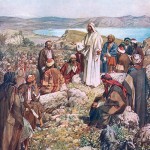The disciple is not above his master: but every one that is perfect shall be as his master.Luke 6:40
For the casual observer, the parables of Matthew 13 seem fairly straight-forward. The Kingdom of Heaven is compared with several pictures from every day life, such as planting seeds, leavening bread, finding a good deal, and fishing. Indeed, to a child, these parables would seem, nearly, to be the simplest explanation of how the Kingdom of Heaven operated, and yet, there yet exists a body of thought that disagrees. In discussing this difference with a friend of mine, his response was straight-forward: You need to go to Seminary to learn things like that. It wasn’t flattering of Seminaries, either.
The problem presented with the parables are precisely what are mentioned on both studies of these issues. Are the things that Jesus is describing about the Kingdom good things, or are they bad? What is the scope? And, how could a thing such leaven be described as good?
Examination of these things, however, must be in the light of Luke 6:40, above. Jesus said, in Matthew 12:28, “But if I cast out devils by the Spirit of God, then the kingdom of God is come unto you.”. To Jesus, the presence of the Kingdom (not the Kingdom itself, mind you) was proved by his mighty works. The Kingdom of Heaven, in all the cases Jesus talked about, was a good thing.

